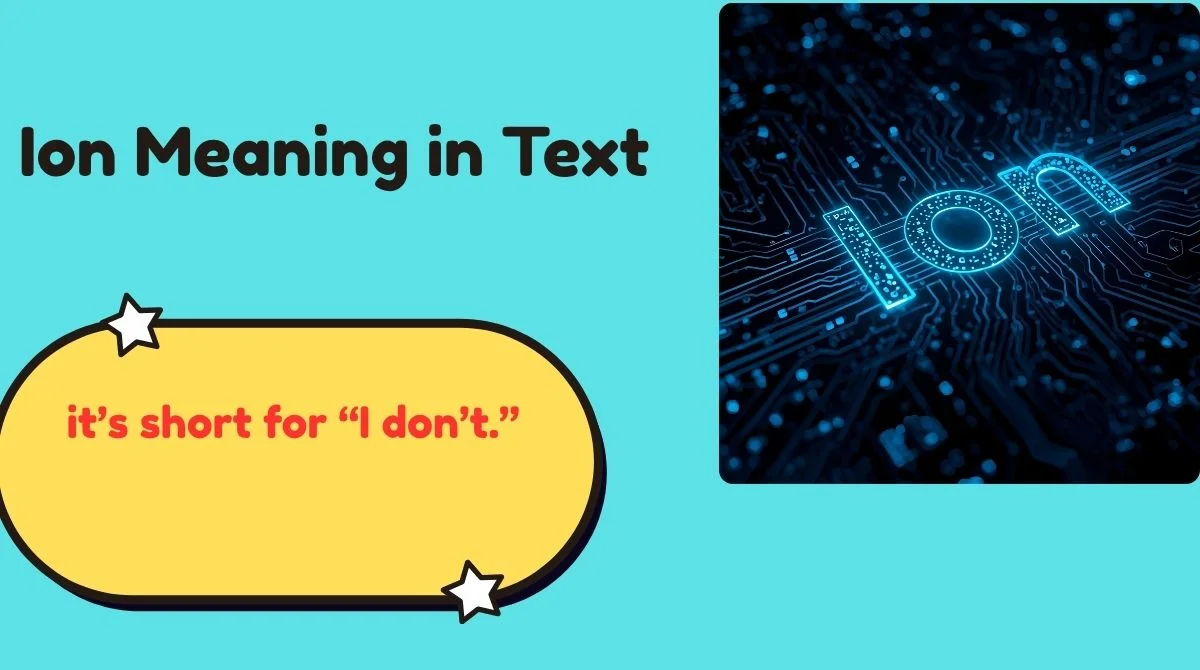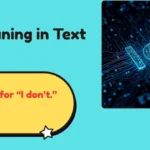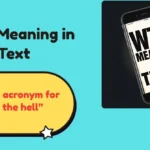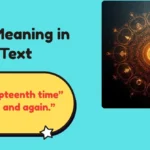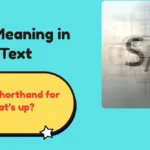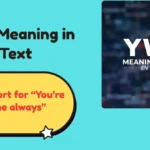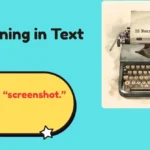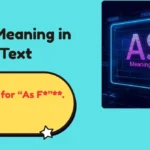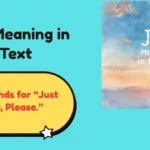Texting has transformed the way we communicate. Shortcuts, slang, and abbreviations dominate messages, especially among Gen Z and millennials.
One term you might see popping up frequently is “Ion.” If you’ve ever scratched your head wondering, “What does ion mean in a text?” you’re not alone. This guide will break it down, explain the contexts, and show you smart ways to respond.
🔍 What “Ion” Means in Text Messages
At first glance, “ion” looks like a science term, but in text language, it’s short for “I don’t.” It’s used to convey disinterest, refusal, or emotional distance, depending on the context.
For example:
- “Ion feel like going out tonight.” → “I don’t feel like going out tonight.”
- “Ion care about that.” → “I don’t care about that.”
Texting slang often evolves quickly, and “Ion” is a perfect example of how language condenses for efficiency and casual tone.
🧠 Origin and Evolution of “Ion”
“Ion” started as street slang and made its way into online texting. It’s popular in social media posts, DMs, and casual texting, particularly among younger demographics.
- Early slang roots: The phrase “I don’t” was shortened in speech to “I’onn” and later written as “Ion.”
- Social media adoption: Platforms like Twitter, Instagram, and TikTok helped normalize its use.
- Evolution: Originally, it was used mainly to indicate refusal. Now, it’s expanded to show disinterest, confusion, or even emotional detachment.
Similar slang includes “idk” (I don’t know), “smh” (shaking my head), and “bruh” (a general expression of disbelief or emphasis). Understanding Ion meaning in texts requires knowing this evolution.
💬 How “Ion” Is Used in Text Conversations
The versatility of “Ion” depends on context. Here’s a deeper look:
Expressing Dislike or Disapproval
When someone uses Ion, they might be subtly saying they don’t like something:
- Example: “Ion eat sushi.” → “I don’t like eating sushi.”
- Tone: Casual but direct.
Avoidance or Refusal
Ion is often a soft refusal. It allows someone to say no without harshness:
- Example: “Ion got time for that.” → “I don’t have time for that.”
Indicating Unawareness or Confusion
Sometimes, Ion communicates lack of knowledge or understanding:
- Example: “Ion know what to say.” → “I don’t know what to say.”
Displaying Emotional Distance
It can also signal detachment or minimal emotional investment:
- Example: “Ion really care about that.” → “I’m not emotionally invested in that.”
Emoji combinations often amplify the tone: 😒, 🤷♂️, or 💀 can make the message feel sarcastic, casual, or playful.
⚠️ When Not to Use “Ion”
While Ion is handy for casual texting, there are times to avoid it:
- Professional settings: Using “Ion” in emails, work chats, or LinkedIn messages can seem lazy or unprofessional.
- Unfamiliar contacts: People who don’t know texting slang may misinterpret the message.
- Overuse in group chats: Constant use can make you appear indifferent or uninterested.
✅ Alternatives to “Ion”
Using alternatives can help tailor your message tone for the situation.
| Tone | Alternative Phrases | Example |
|---|---|---|
| Casual / Slang | “Nah,” “Not really,” “I ain’t,” “Can’t” | “Nah, ion going tonight.” |
| Neutral / Everyday | “I don’t think so,” “I’m not sure,” “That’s not for me” | “I’m not sure I’m up for that.” |
| Polite / Professional | “I’ll have to pass,” “I’m going to decline,” “I’d prefer not to” | “I’ll have to pass on that proposal.” |
Choosing the right alternative ensures your message is clear and context-appropriate.
🎯 How to Choose the Right Alternative
Here are some tips:
- Match the tone: Friends can handle slang; coworkers need neutral or professional language.
- Consider clarity: Avoid ambiguity in serious conversations.
- Be concise: Short, polite phrases often work better than long explanations.
Example:
- Poor choice: “Ion guess I’m okay with that but maybe not really.”
- Better: “I’m going to pass.”
📥 15 Ways to Say “Ion” (With Context)
Sometimes, you need specific alternatives that match your mood or relationship. Here are 15 effective ways to reply to “Ion”:
- “I’d rather not.”
- “That’s not really my thing.”
- “I’m not into that.”
- “Doesn’t interest me.”
- “That’s not for me.”
- “I’m not comfortable with that.”
- “I’d prefer something else.”
- “No thanks, I’ll pass.”
- “I’m going to sit this one out.”
- “That’s not something I support.”
- “I’ll have to decline, respectfully.”
- “Let’s skip that.”
- “I don’t feel strongly about that.”
- “Not my vibe.”
- “I’m opting out this time.”
Using these alternatives can prevent miscommunication and awkwardness, while keeping your tone friendly and clear.
🗣️ Why Understanding These Alternatives Matters
Understanding how to respond to Ion and its alternatives helps:
- Avoid misunderstandings: You can convey refusal or disinterest politely.
- Maintain relationships: Tone matters; the right wording keeps conversations smooth.
- Reflect maturity: Using context-appropriate responses signals emotional intelligence.
Frequently Asked Questions
What does “Ion” mean in slang?
It’s short for “I don’t” and can express refusal, disinterest, or emotional distance.
Can “Ion” be used professionally?
Not really. It’s casual slang best for texting friends or informal chats.
How do I respond if someone says “Ion”?
Use context-appropriate alternatives like “I’d rather not” or “No thanks, I’ll pass.”
Is “Ion” only used by Gen Z?
Mostly yes, but it’s also spreading across social media to other age groups.
Can “Ion” be misunderstood?
Yes. People unfamiliar with slang may take it as rude or apathetic.
📚 Final Thoughts
Ion is a small word with multiple shades of meaning. It’s flexible, quick, and casual but requires context awareness. Knowing how to interpret it and respond appropriately ensures smooth communication, prevents misunderstandings, and keeps your text game strong.
Next time someone says “Ion”, you’ll know whether it’s a soft refusal, casual disinterest, or just a playful remark—and how to reply confidently.
